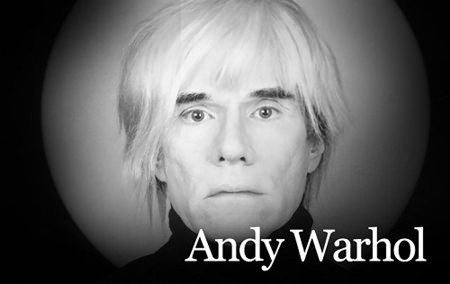Last week I covered the amazing Weegee. A photographer who never flinched taking shots of people who had been shot. Weegee was photographing the end result of people’s misfortune. He did not make the viewer wonder about the situations he photographed. By comparison, let us look at another artist/photographer who is remembered for his ability to record the human psyche in all its shallowness (and complexity). This is Andy Warhol (1928-1987), a complex character himself, and probably even deeper than Cartier-Bresson.
Andy Warhol was born in Pittsburgh USA, the son of Czechoslovakian immigrants. He studied pictorial design and art history, sociology and psychology, and worked initially as a commercial artist for Vogue and Harper’s Bazaar and the I. Miller shoe company, where he was paid per shoe he drew. Andy did not mind this, as he was able to quickly work out how much he was owed!
 Andy Warhol (1928-1987).
Andy Warhol (1928-1987).
In 1962 he produced his silkscreen prints on canvas of dollar notes, Campbell’s Soup tins, and Marilyn Monroe (copies of which can be still seen in any copy artist’s studio in Thailand). The 32 soup cans were a deliberate attempt by Warhol to produce ‘legitimate’ art, trying to show that the human mind was attracted by the ‘sameness’, and it was the continuous exposure to those kind of images that produced a sense of security in the viewer. It was a conundrum of producing ‘art’ from something that was almost the antithesis of art.
From there he branched out into photography as well, but rather than take carefully arranged photographs, Andy Warhol went the other way, using a Polaroid camera to record ‘instant’ photographs, again in the anti-art genre. There are no well lit, carefully posed, complementary background photographs from his Polaroid era. Many were filled with clutter. And Andy Warhol could not have cared less.
In fact, as he then began to move in the Hi-So circles, Warhol would go out every night and capture the people on film. “You want to go out every night because you’re afraid if you stay home you might miss something,” wrote Warhol many years ago. In many ways a similarity appears between Warhol and Weegee. Neither wanted to miss what the night might bring.
Warhol had discovered that the life in America was like his Campbell’s Soup tins. Everyone wanted to be exposed to the public, the more times the better. The more recognizable, the more ‘famous’ you had become, and Warhol was the man who would be there. The ‘ultimate’ street photographer. Just as Weegee photographed the ordinary people, Andy Warhol photographed the out of the ordinary people. His relentless shots taken in Studio 54, the ‘in place’ disco, are albums of freaks, hangers-on, minor celebrities, aging movie stars, starlets eager for any publicity, drunks, transvestites, designers, people with designs on being designers, the whole superfluous and superficial crowd. And Andy got them all, and in some ways recorded an era for posterity.
I think that from originally being a voyeur, Warhol eventually began to believe his own press and his florid behavior became even more outlandish. He made movies of incredible length – Sleep, a six hour epic and Empire even two hours longer. But of course the world was ready for someone like this. The post war liberalization was breeding people who would symbolize the extremes that the new freedoms had brought.
Warhol continued with his entourage around him who I believe were needed to keep his empire going, as Warhol himself was too distracted to be able to keep track of what was happening. He was having showings and exhibitions all over the world, and was treating them all and the viewers with artistic contempt, his way of shielding himself from the world or revealing his true introspective nature.
As the world moved into the 80’s, America changed, and the attitudes changed with it. There were fewer places for people like Andy Warhol to feel secure in. Reality was returning after the excesses of the 60’s and 70’s, and the Warhol star was on the wane.
However, today people once more want their image to be seen. Enter Facebook and the “selfie”.
Warhol died from a post-operative complication in 1987.




